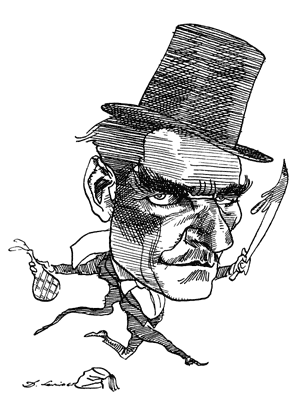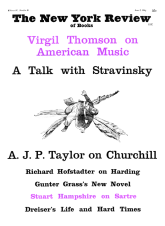As the “father of a nation,” Mustata Kemal is a more interesting figure than most of his trade. Today the fathers of nations drift about the lobbies of the United Nations in careworn droves, the wails of their neglected brood making a proper acquaintance almost impossible. And in fact few of them would greatly repay acquaintance. The Bandas, Kaundas, and Ayubs are worthy men, but not up to the stature of Kemal Atatürk.
Kemal, after all, defeated Europe in battle. In full war, with trenches, howitzers, aircraft, the mortar barrage, he defeated the British Empire at Gallipoli and the Greeks in Anatolia, and threw the French out of Cilicia with a glancing blow. Such a victory was not to recur until the Japanese conquered Southeast Asia. Kemal was perhaps the last nationalist leader, however, to attach his nation to the company of Europe after defeating European imperialism in his own country. He was the first leader to break violently with the nineteenth-century conception that folk-customs and cults were a component of nationalism. He was among the last leaders not to fall flat on his face before the great god of foreign investment, and one of the very, very few revolutionaries whose victims included Puritanism. The regime which he founded in Turkey also performed the feat—not yet imitated—of deliberately dismantling a dictatorship and calling free elections (which overthrew the Government).
With his gray face and oblong, glittering blue eyes, Kemal looked a cruel man, and cruel he could be. He brought death to Armenians and Kurds, and to his political enemies on occasion, as well. But he had also a marvelous quality of cynicism, of humor, and even self-mockery, which disarmed those who knew him well. The Poles have had a good many leaders with something of Mustafa Kemal: Sobieski with his victories, drinks, and dirty jokes; Pilsudski with his impatience and the biting sarcasras he flung at the people he ruled; Gomulka, heroically retaining his blazing temper by holding tight to the underside of conference tables. Kemal, like these, was not a prig.
In this enormous and enlightening book by Lord Kinross, we see Mustafa Kemal beginning his life as an army officer, commissioned to serve a moribund Empire. By his time, the imminence of collapse was accepted almost everywhere among thinking Turks, and the army, with its young officers widely involved in secret organizations plotting against the Empire, was plainly going to be the source of the new power. Kemal plotted with the rest, and with them witnessed the daily humiliation and decline of the Ottoman Empire. Yet he never felt that the moral regeneration of Turkey required a cauterizing austerity, as antidote to luxurious decay. He was not at all that type of young Moslem officer who wants to burn up the foreign oilmen In their clubs and put the nation on a regimen of orange juice. Bitterly and rightly as he resented the “Capitulations” which gave the powers of Europe almost colonial privileges in Turkey, he did not rage against the degeneracy of these Europeans and connect it with the degeneracy of his own rulers.
Kemal, on the contrary, wanted the Turks to enjoy. It was the secret of enjoyment, more than the secrets of the Bessemer converter and of proportional representation, that he wanted to learn from the West and give to his people. In this sense, Mustafa Kemal was a genuine emancipator: something more than a mere “Liberator.” Lord Kinross describes Kemal’s impressions as a young Turkish military attaché in Sofia: the fourth-rate splendors of the Bulgarian capital overwhelmed him, and not merely with awe. At the opera, men and women came together boldly dressed and spent an evening of enjoyment with secular music. In the Grand Hotel de Bulgarie, people laughed and drank together, wearing comfortable clothes. Perhaps nobody else saw the heights of the human spirit expressed in the Grand Hotel do Bulgarie, but to Kemal the casualness, the permissiveness, and absence of convention, the presence of cheap drinks and even available girls were the real achievement of Western culture. He wrote later: “The Ottoman Empire was a place where the joys of Heaven were reserved for non-Moslems, while Moslems were condemned to endure the shades of Hell.”
After the wars had been won and he controlled an Anatolian Turkey from Ankara, Mustafa Kemal set about forcing this sensual emancipation upon the Turks. The Sultan went, a republic was proclaimed before the Turks could object to it, then the Caliph was expelled. Islam was disestablished, the religious brotherhoods suppressed, and the sacred tombs closed. Here, in his treatment of religion, Kemal’s cynicism was at its most pungent. Disestablishment was, according to his public speeches, “to secure revival of the Faith” “to liberate and elevate the Islamic religion from its position as the tool of politics.” When the tombs were shut, a friend of Kemal’s who was opposing the measure was quietly told: “Don’t oppose the motion. In ten years’ time you’ll be able to open them all up again.”
Advertisement
Towards Islam, Kemal remained always hostile. He was not a doctrinaire laicizer like Joseph II, but a shrewd tactical operator like the first Elizabeth of England, who knew how to tame religious forces without outraging them. But he never felt that Islam could be used positively for his political ends, nor subscribed to that interpretation of Islam which brings Moslem extremists and Communist ascetics close together. As far as Kemal was concerned, there was no God and H. G. Wells was his prophet; he did not always succeed in restraining the fury which religion provoked in him when he came across it. At the town of Ushak, where Kemal arrived one day by train when rather drunk, he saw a turbanned holy man in the crowd and started abusing him. When the man flung away his turban and escaped, Kemal gave orders that the military commander of Ushak should be arrested and the town shelled to dust by the army. (Next morning, he cancelled the order. Kemal always had a good look next day at the orders he had given the night before when drunk, and cancelled the madder ones. Self-knowledge and even a sort of humility were among his virtues.)
The forced emancipation included the episode for which Kemal is probably best remembered by an ignorant world: his war on the fez. Extraordinary and comic as this campaign now seems, this was a very tough and nearrun fight indeed against the swelling forces of peasant bewilderment and reactionary outrage which the Kemalist revolution provoked. The unveiling and emancipation of women, even the planned introduction of the fox-trot, were less dangerous. Ruthlessly Kemal lashed his people forwards into comfort and pleasure; he himself preferred the wailing Anatolian music he banned from the Turkish radio, but vodeodo was nicer and all must make a sacrifice.
Lord Kinross’s book is as good a general study as is likely to be published in our time. The research has been minutely and painstakingly done over many years; the writing is spare and effective through the whole, very long, book. One could regret that some more general political reflections were not made (about Western attitudes to Turkey, for instance, or the social condition of modern Turkey thirty years after Ataturk’s death), but these had to be sacrificed to the biographical form if Kemal was to be revived in such detail. Occasionally this detail is pointless; but most of it describes vividly a man who was often far from the model of a Pater Patriae. All his life, for instance, Kemal drank vigorously; most evenings (except in battle) he was well soused, and he died of cirrhosis. He enjoyed sitting up all night on brandy and raki, playing poker with cronies or simply talking the company into the ground, and he would get up extremely late the next day. His sexual tastes demanded an everflowing stream of casual girls and small boys; his marriage broke up because of his wife’s fatal bossiness on the topic of raki, and he ended up by “adopting” several adolescent girls to whom he was “father, lover and schoolmaster” all at once.
None of these things diminished Atatürk, because he was so frank about them. It annoyed, but did not enrage him to be attacked on the matter of girls and booze. Perhaps his emancipation of the Turks was a subconscious attempt to make a country in which he himself would enjoy life; certainly, his “vices” hardly impaired his terrific energy until the very end of his life. He managed to avoid the fatuousness of powerful men, and did that thing which rulers—despite legends—so rarely do: went drinking with porters and fishermen in small bars.
Like all military revolutionaries, Kemal feared disorder too much to undertake revolution in the place it was really needed: in the countryside. Politically, his first experiments at a party system with Opposition failed, and were quietly shelved until 1950. The loyal team who made the revolution with him were too often forced off the stage, though seldom persecuted. Changes came intolerably fast, and under the surface boiled hysteria and violence which Kemal feared a party conflict might release. Though his rule was much too pragmatic, too pacific in foreign policy and even too personal to be called fascist, he left Turkey sound rather than democratic.
Lending solidity to his achievement is the background of folly and greed provided by Western foreign policy towards Turkey up to 1923. To believe that the Greek peasants fleeing towards Smyrna in 1922 cried “Bad times for George!” is less difficult to credit than Lloyd George’s policy itself: egging on the Greeks under Venizelos to create a new Hellenic empire in Asia Minor. And this was only the successor to schemes for ending the war by offering Germany Anatolia. But in spite of these crimes, and partly because of some most able Western ambassadors in Ankara, Turkey is now a member of NATO. The Turk, once atrocious, now looks westward as an emblem of anti-Communist solidity and dependable bayonet work. Kemal turned Turkey’s back on the lands from Mosul to Tobruk but it may now be time she once more took notice of them before their instability brings about a general war.
Advertisement
This Issue
June 3, 1965




